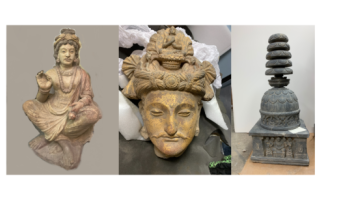Subhash Kapoor was arrested in Frankfurt, Germany, in 2011 and extradited to India, where he was charged with burglary and illegal export of idols from the Hindu Varadharaja Perumal temple, outside the southern Indian city of Kanchipuram.
For the past decade, he had been languishing in a Chennai prison as his trial progressed. He was finally convicted and sentenced last week.
Kapoor ran the swanky art gallery Art of the Past on New York’s Upper East Side for decades but authorities have been investigating him since the early 2000.
“For over a decade, the District Attorney’s Antiquities Trafficking Unit, along with law enforcement partners at Homeland Security Investigations, have investigated Kapoor and his co-conspirators for the illegal looting, exportation, and sale of artifacts from numerous countries all over the world,” the Manhattan District Attorney explained in a statement last month after the return of three hundred looted artifacts to India.
“Kapoor and his co-defendants generally smuggled looted antiquities into Manhattan and sold the pieces through Kapoor’s Madison Avenue-based gallery, Art of the Past,” he said.
Over 2,500 looted artifacts, largely from Southeast Asia, were identified in connection with Kapoor and valued at more than US$143 million.
Kapoor has also been charged in the U.S., and is expected to be extradited now that his criminal proceedings in India have concluded, according to Artnews.
The Illegal antiquities trade is a multi-billion dollar global industry according to a 2018 report by Standard Charter Bank, and it’s beneficiaries are not just high society art aficionados like Kapoor and his Manhattan clients, but often the trade is a major funding source for criminal and militant groups on the supply side.
“You cannot look at it separately from combating trafficking in drugs and weapons. We know that the same groups are engaged, because it generates big money,” said Catherine de Bolle, Executive Director of Europol after a major crackdown on the illegal antiquities trade in May 2020.
The looting of cultural property from active war zones is considered a war crime under the 1954 Hague Convention.






